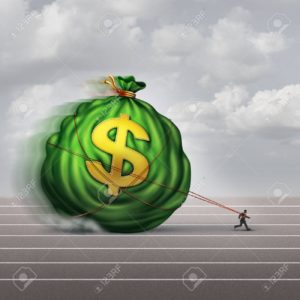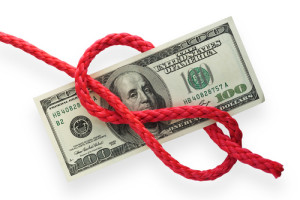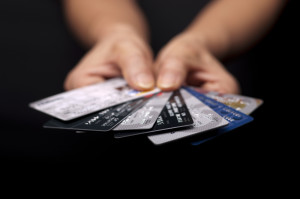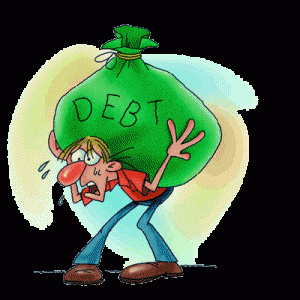October 22, 2020
 Are you in a credit card debt? Credit card debt is something that most adults out there tend to struggle with. However, for some, it becomes a frightening cycle in which they might get stuck for the rest of their lives. As per a recent study report, it was revealed that around 75 percent of consumers having credit cards tend to carry around $6200 as the average balance.
Are you in a credit card debt? Credit card debt is something that most adults out there tend to struggle with. However, for some, it becomes a frightening cycle in which they might get stuck for the rest of their lives. As per a recent study report, it was revealed that around 75 percent of consumers having credit cards tend to carry around $6200 as the average balance.
Lately, in the year 2019, credit cards having higher than average balances had increased by as much as 3 percent. This implies three-quarters of earning adult population is trying to manage credit card debt in some way or the other. This is the reason why learning to manage, and paying down your credit card debt turns out to be more important than ever.
Here is our guide into managing credit card debt like a pro:
#Learning How to Use Credit Cards Responsibly
When you are trying to get out of credit card debt, the first thing that you would like to ensure is to understand the proper use of the credit card. Credit cards serve to be great financial tools for aspects like earning reward points, building the credit card history, and serving as a highly secure way of ensuring payments other than cash.
When you make use of the credit card responsibly, it also implies that you are expected to pay the bills on time for the given due amount. When you do not aim at paying your bills on time, it is going to ultimate harm the overall credit. This is because credit history turns out to be the biggest factor that is regarded when you are analyzing the credit score.
Huge amounts of debts would also reflect poorly on your overall credit score. Therefore, it is recommended that you should not make use of the credit cards out of your financial limits. You should aim at making use of the credit cards for buying what you need within the budget and have the ability to pay back.
#Knowing Your Budget
A budget serves to be a detailed plan about how you will be managing your money. This can be done by tracking your overall dollars that you earn as well as spend. A budget helps in providing you a clear picture of your overall financial life. It also allows you to be aware of the extra money that you are required to spend or the loss of money that you have currently.
When you are aware of the budget, it serves to be a vital part of your debt management strategy. This is because it reveals how much money you will have for paying your bills on time while paying down the debt. Particularly when it comes to paying off the debt, you will be required to know the amount of free cash flow that you should put in additional funds for debt payments.
#Paying More Than the Minimum Payment
With the passage of time, when you pay only the minimum amount, it will end up costing you more money. This is because as you would carry a balance on the respective credit card, balance accrues interest on a daily basis. However, when you are paying the full balance off as per the due date, you will not be getting charged any interest.
#Understanding the Credit Utilization Rate
Do you know what credit utilization rate is? A credit utilization rate is regarded as the ratio between the amount of revolving credit that you have in comparison to how much is available out there. Individual credit utilization rate is a major part of what will be used for determining the credit score.
A lower value of the credit utilization rate implies that your credit cards have not been maxed out. This also implies that you are managing the overall credit properly.
On the other hand, a higher credit utilization rate implies that you are not spending your money wisely while having higher amounts of debt related to credit cards.
As per the ideal credit utilization rate, it is expected to be around 30 percent. If the same goes above 30 percent, then you should aim at lowering the credit utilization ratio in the respective management plan for your credit cards.
Lowering the same will help in decreasing your debt while increasing the credit score.
#Improving the Spending Habits
If you are not adept at your spending habits, you should aim at fixing the same right away. Poor habits including spending more than what you are earning are not right. It is recommended that you should consider changing the spending behavior to be in line with the respective budget.
You can consider implementing techniques for effective money-saving like buying on sale, using coupons or discount codes, ensuring frugal living, and so more. All of these techniques can help in improving your overall spending while allowing you to save more to pay off all your debts.
You should take time at developing good spending habits. This will serve to be a long-term strategy for managing the overall debts & finances. You would not like to have healthy spending to serve as a temporary solution. Rather, you should aim at making the same as your long-term lifestyle habit to achieve your financial goals.
#Reviewing the Credit Report
The credit report that you have is the review of all your past as well as present credit activity. It allows you to know about every creditor to whom you owe money. Most importantly, it allows the lenders to be aware of the history of the respective debt payments. This will help in determining if they would like to loan the money to the borrowers and the interest rate for the same. The credit report is known to affect the overall ability of the borrowers to borrow money. Therefore, you should ensure that it is positive and accurate.
Conclusion
Make use of the right strategies for waiving off debt on your credit card history.
Tags:
Credit Card,
Credit Card Debts,
Debts,
economy,
financial planning,
money,
personal finance
December 15, 2015
 The statisticians may tell us that the recession has been over for three or four years and that incomes have returned to pre-crisis levels. But for millions of people in the UK, the reality is that times are still hard and money short.
The statisticians may tell us that the recession has been over for three or four years and that incomes have returned to pre-crisis levels. But for millions of people in the UK, the reality is that times are still hard and money short.
The good news, however, is that while you may have had a difficult year financially during 2015, there is no reason why you can’t make a New Year’s resolution to get your finances back on track in 2016. The situation is rarely hopeless, particularly if you are in work or have some other regular income. Even if you have large unsecured debts, there is usually a way for you to start reducing them and increase your disposable income at the same time.
If you want to tackle your financial issues in the year ahead, then you’re going to need some discipline and some determination to change the way that you may have behaved over the last few years. Getting your finances back on track may not be easy but it is probably simpler than you think:
1. Stop beating yourself up
This is a prerequisite if you want to reduce your anxiety levels and make a start on tackling whatever financial problems you may currently be facing. It’s human nature to keep going over past mistakes and blaming oneself for silly decisions but what is done is done and now is the time to drop the blame and start concentrating on the future. Learn to accept what has happened and move on, concentrating instead on implementing positive steps to improve your financial outlook.
2. Make a financial inventory
Do you actually know how much you owe banks, mortgage companies and other financial organisations? It’s important to have a grasp of your total liabilities so that you can put in place long-term plans to repay this debt entirely. That means making an inventory of everything you owe – both secured and unsecured – as well as the remaining loan terms and the interest rates which you are being charged on each loan and credit card.
3. Prioritise credit with higher interest rates
If you’re going to make inroads into your debts in 2016 and relieve the pressure you’re under, then you should start increasing the amounts you repay on the mortgages, loans and credit cards that charge the higher amounts of interest. This is the only way that you’ll be able to increase the speed that you reduce your total amount of debts.
4. Make a list of everything you spend for a month
If you’ve got Excel or other spreadsheet software and know how to use it, then this is a brilliant tool for doing this important task. Make sure you list all of your income and all of your expenditures. Don’t be tempted to miss out things like coffees from the coffee shop or the odd treat – you need to be completely honest with yourself about where your money is going before you progress onto the next step.
5. Make a household budget
Once you’ve worked out everything you spend for a month, you’ll be in a good position to set a household budget. Using your spreadsheet program, list all outgoings (with the fixed ones at the top) and all of your income. Let the software work out totals (if you know how) and then calculate whether you should have money left over or if you are spending more than you earn. If it’s the latter, look at the non-essentials on your list and consider what to cut. Think about your food budget – could this be reduced either by using a cheaper supermarket or by cutting out some of the items which might be considered luxuries? The household budget will make it much easier to see where you can save money and divert that into reducing your household debt.
6. Consider consolidating debt
If the amount you’re paying in interest, fees and other charges is overwhelming you, you might want to make 2016 the year when you consolidate all those cards and other loans into a single, monthly repayments. Plenty of companies beyond the high street banks offer consolidation loans and the amount of interest you’ll pay may be surprisingly lower than you’re currently used to. The amounts on offer go all the way up to £25,000 for unsecured loans and even higher if you consider secured lending.
7. When you’ve paid off a card, close it
If you’ve got unused credit available, there is always going to be the temptation to start buying things that you probably can’t afford. The easiest way to stop yourself doing this is to close card accounts when you have paid off the outstanding balance. Always leave yourself one to cover financial emergencies but get rid of the rest and use the money you are saving to pay off further debt.
8. Debt repayment is a snowball – learn how to use it
When a snowball rolls downhill, it not only gathers speed but it grows larger and larger as it picks up more snow. Debt repayment is exactly the same if you are disciplined about it. When you start paying back debt, you reduce the amount of interest that you’re paying and so release money to pay off even more debt and so on. If you hit the loans and cards with the highest interest rates first, you’ll be tackling the biggest source of your financial worries and releasing more and more money to pay off other debts more quickly.
Article provided by Mike James, an independent content writer in the financial sector – working with a selection of companies including Solution Loans, a technology-led finance broker with many years experience – who were consulted over the information contained in this piece.
Tags:
budgeting,
Credit Card Debts,
Debt Problems,
Debts,
economy,
financial planning,
personal finance
October 19, 2014
 The credit card is completely different to the original concept of the idea of using credit. While the original credit card was paper, this quickly developed to the plastic one that adorns many purses and wallets around the world.
The credit card is completely different to the original concept of the idea of using credit. While the original credit card was paper, this quickly developed to the plastic one that adorns many purses and wallets around the world.
The original idea behind the credit card was to pay the debt in full at the end of each month. You only became eligible for a credit card if you were a special and privileged client. Often the banks lost money on the credit card, with high fees, but this didn’t matter if it meant a customer was happy and loyal. The change in the use of the cards is apparent as customer’s now, often have balances from previous months spending.
However, slowing the evolution of the credit card took place and it was no longer a privileged accessory but one many people demanded as an easy access to some form of credit.
A credit card has become a necessity in the majority of homes; it pays for luxuries but also a way to pay for the essentials. With the companies competing for the larger slice of credit from the consumers, more and more people opted for the credit card as a way to pay for everyday life.
While improvements in the economy is a positive angel, wages have stayed comparatively low. This has led consumers to look for credit in all places and credit card companies have obliged.
What is staggering is the fact that in 2008 credit card transactions over took cash transactions in America. This is a worrying statistic in the current economic climate.
However, life has changed.More and more families are in a lot of debt due to the credit cards and rising housing costs. Consumers are struggling with the debt they are experiencing, the credit card companies are continuing to push the cards and increase the amount of debt.
Credit problems are bad that the amount on bankruptcies are increasing, meaning the credit card companies are potentially losing money through bad debt.
However, whilst this might seem that the evolution of the credit card is bad, the changes haven’t completed and there is still hope for the future.
Tags:
Credit Card,
Credit Card Debts,
Debts,
economy,
money,
personal finance
October 21, 2012
 With the average household debt increasing constantly all over the UK, homeowners everywhere are struggling to keep their increasing monthly payments under control. Without the proper debt management solution, their attempts are frequently accompanied by failure and most of the times lead to a growth of their monthly payment that simply cannot fit in their budget.
With the average household debt increasing constantly all over the UK, homeowners everywhere are struggling to keep their increasing monthly payments under control. Without the proper debt management solution, their attempts are frequently accompanied by failure and most of the times lead to a growth of their monthly payment that simply cannot fit in their budget.
The various credit card related debt as well as the other large payments like mortgages, education or automobile loans are getting out of hand, an aspect which reflects in the rising number of people filing for bankruptcy. However, an alternative road to financial security and freedom comprises of corroborating your credit card debt with a secured loan. Let’s find out why.
1. The overall monthly interest paid is reduced
The principal issue and the main generator of credit card debt is the high interest rate in association with the additional charges. In essence, unsecured loans have an innate high interest rate that guarantees your lender he will be able to recuperate at least a part of his investment if you are not able to pay your debt. On the other hand, homeowner loans are secured against equity, which means that the risk you pose for the creditor is lower. Therefore, the interest rates of the loan are substantially reduced.
2. Your income/spending budget can be calculated easier
When you have a plethora of credit cards that have to be paid on different dates and each of them requires minimum monthly payments, your debt can easily spiral out of control. It’s hard enough to stay up to date with the major loans, so adding credit cards into the equation complicates things immensely. However, since a single affordable payment can be easily integrated within your budget easier and it eliminates effectively the need to remember every other single debt you have, you are greatly simplifying your finances.
3. A single creditor to deal with
The more unpaid credit cards you own, the more calls you will receive from the lenders and banks. As your debt grows – and, without the proper solution, it will – you will start to receive more and more calls from the creditors, often at the most inappropriate moments. However, since the secured loan consolidates all debts into a single account and the lender takes charge of handling your finances, you can be certain that your other creditors will no longer trouble you.
4. Enhanced affordability for the monthly payments
Secured loan consolidation doesn’t only imply that the value of the interest is lower. In fact, you can also specify a longer repayment period, which permits you to minimize the monthly payments to a sum that you feel comfortable with. True, the total interest paid is directly proportional to the span of the repayment period, but you will be able to manage your household budget easier.
5. You won’t be tempted to spend more than you should
What every credit card actually represents is a lure for overspending. In other words, how great is it to purchase something you want – not necessarily need – now and pay for it later? Cutting up your credit cards and consolidating the debt with the secured homeowner loan is just the cure you need for that temptation!
Tags:
budgeting,
Credit Card Debts,
Credit Cards,
debt,
financial planning,
home loans,
investments,
L:oans,
money,
personal finance
 Are you in a credit card debt? Credit card debt is something that most adults out there tend to struggle with. However, for some, it becomes a frightening cycle in which they might get stuck for the rest of their lives. As per a recent study report, it was revealed that around 75 percent of consumers having credit cards tend to carry around $6200 as the average balance.
Are you in a credit card debt? Credit card debt is something that most adults out there tend to struggle with. However, for some, it becomes a frightening cycle in which they might get stuck for the rest of their lives. As per a recent study report, it was revealed that around 75 percent of consumers having credit cards tend to carry around $6200 as the average balance.



Recent Comments